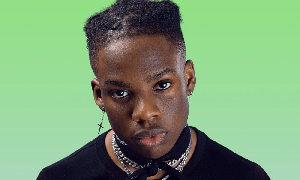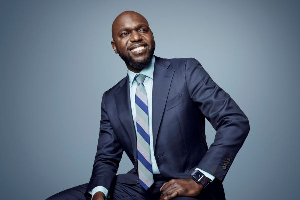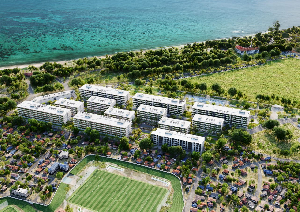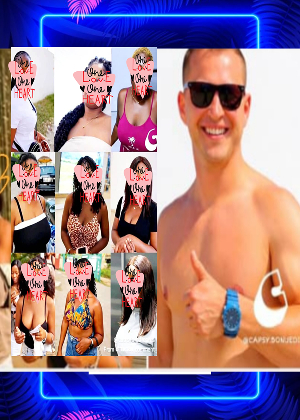Sports News of Wednesday, 23 December 2020
Source: swanseacity.com
Andre Ayew talks about inspiring a nation and family responsibilities
He wears the captain’s armband for Ghana and leads the line for Swansea City. Yet this pales in comparison to the responsibilities Andre Ayew has off the pitch.
Ayew is a tower of strength when it comes to taking the pressure of his team-mates on the pitch, with the Ghanaian regularly the focal point of opposition managers in their assessment of the game.
The 31-year-old is no stranger to the spotlight, with his father – Abedi Ayew – considered one of the greatest African footballers. So the Swans striker has football in his blood.
So too does his brother Jordan, a former Swan now with Crystal Palace, while his older brother Ibrahim is also a professional footballer plying his trade in Europe.
And it is that connection, the family connection, that Ayew carries with him every single time he takes to the field.
It is not just doing his best to help Swansea City be successful that Ayew has to deliver week in, week out. He also has to deliver to a lot more than the Jack Army.
Sitting casually at the club’s Fairwood Training Ground, Ayew opens up on the responsibilities he has on his broad shoulders.
“It’s African culture that you follow your heart and that you support your family,” says Ayew.
“Your family includes all your aunties, uncles, cousins, nephews, nieces. So we must provide support for them in every way possible. Maybe it’s the basic thing like food, or maybe it’s for education, housing or travel.
“Myself, Jordan and my big brother (Ibrahim) are very fortunate to be in a position where we can help our family. My dad used to do it when he was playing, and he still supports all the family along with myself and Jordan. I am very lucky, because my dad was a great player and provided for the family, which included his 15 brothers and sisters. He set the pace, now myself, Jordan and my big brother take on the role to provide to our family.
“It’s a tradition that whoever earns the most money has to make sure they help the others. That’s why I have so much respect for all the African players who play in Europe, because people may talk about some of the money they earn, but how much of that is going to his mother, his brother, his sister, his aunty, his uncle, his cousins? They are providing the basics like food to all of their family along with anything else they can help with.”
Ayew grew up in East Legon in Accra, where he would attend school with the children of some of the most richest people in Ghana. After the final bell, he’d head home to play football on “all kinds of surfaces” with his closest friends. While Ayew was the son of the country’s best footballer, his friends were far from wealthy.
These were friendships which Ayew holds dearly today, and ones that forever keep him humble and grounded.
“I am lucky, and I remind myself of that every day,” he quickly points out. “Thanks to my dad’s career we had what we needed, but that wasn’t the same for everyone, including my dad during his early years.
“Some of my friends were living in unfinished houses – it is a common thing in Ghana. We’d play football until it was dark, go back to my house sometimes for some food, and do it again the next day. Now, when I go back to Ghana, I meet up with those guys and chat, go for food and things like that, and I’m happy to help them now too. They have experienced different things in life, but it’s important that we see each other when I am back in Ghana.”
Helping others is a common theme since making his debut for French side Marseille – the same team his dad helped win the European Cup in 1993.
He shares stories of some incredible gestures that have saved the lives of children in Ghana. Ayew talks calmly and humbly as he recollects. For this is Andre Ayew, not the successful footballer talking, but Andre Ayew – father of two children.
“It’s not really something I talk about because it’s about helping people rather than someone saying nice things about me,” he says.
“I do things from the heart and to help people. But there’s been a few times where I have helped with some medical bills.
“There was one occasion where I saw parents sobbing with their head in their hands in a hospital. “Their daughter needed an operation on the heart, and it was costing more money than they could ever imagine to have. This was a child that was suffering, and I was in a fortunate position to take care of that and ensure the child got the treatment it needed. The parents were so happy, and I was happy to help them and their daughter.
“My dad, Jordan, my big brother and other Ghanaian and African players all do this too. It’s part of our culture.”
From helping others off the pitch, to helping the Swans on it, Ayew has been a pivotal figure for Steve Cooper’s side this season.
Ayew has scored seven goals in 19 league games as the Swans enter Christmas sitting third in the Championship.
He is a senior figure in the changing room, and vice-captain too.
Yet, given his responsibilities off the pitch and his past experiences, it is something he feels more than comfortable with.
“I’ve always had pressure, expectancy to deliver and lead – ever since I was a kid,” he adds.
“My dad was one of the best African footballers to have ever played, so the attention was then placed on me when I was growing up. I’ve always carried that pressure with me. I’ve had it all my career, so I am happy to take that role on here because it takes the focus and pressure off the young players and lets them thrive.
“I captained Ghana at under-20 level, I wore the band at Marseille a few times, and obviously now for Ghana’s senior team so I have good experience to pass on to the young guys in the team.
“I really enjoy it here in Swansea – on and off the pitch. It is far less stressful here!
“In Ghana it is very different. You have to understand that people just want to touch you, to have a photograph with you because it means everything to them that they have one of their own succeedings. Football is what we Ghanaians love, so it’s normal that hundreds of people surround you because you’re a footballer that’s doing well in Europe. They look up to you because you’re their pride.
“When we put on that Black Stars shirt, you are not playing for yourself – you are playing for a whole nation because you have to give the younger generation something to dream about and inspire them. Maybe it’s a little difficult for people over here to understand, but Ghanaian and African players have a lot of responsibility to inspire kids in our countries.”
Entertainment











